It’s just after 9:30 on a Thursday morning, two weeks into the new year, and Jerryon Stevens slides quietly onto a long wooden bench in the waiting area outside courtroom 4 at the juvenile courthouse on Hamilton Avenue. The letter sent by the Cook County Circuit Court to the 16-year-old’s house in Humboldt Park stated that today’s session would begin promptly at 9 a.m. Jerryon is late, but he’s among the first to arrive.
Dressed in crisp khakis, a gray sweatshirt, and a gold-stud-emblazoned jacket too big for his slender frame, Jerryon—or Mank, as his friends and family call him—pulls out his iPhone, but service is spotty, so he tucks it back into his pocket. His mother isn’t here today because she’s driving his older brother to a college interview at Northern Illinois University. His father isn’t here because—well, because he hasn’t been around much since Jerryon was little. On this day, the Orr Academy High School sophomore is accompanied only by his grandmother Jackie Hodges and a 17-year-old female cousin.
Sitting with her back against the rigid bench, Jackie recalls how her grandson learned to ride a bike at 3 and used to love playing chess. He was once conversant in both Spanish and sign language and received straight As in elementary school. “Jerryon is such a talented young man,” she says, loud enough to be heard throughout the near-empty room. “But he’s missing something. I don’t know what it is, but he keeps looking. He just can’t seem to be satisfied.” Jackie eyeballs her grandson, who is sitting quietly, his hands drooped between his legs.
Jerryon is in court today to face sentencing on two felony drug convictions. They stem, he explains, from when he was caught trying to sell heroin last summer. It was his first significant run-in with the law, but not the first for the family. Jerryon’s father, for one, according to court records, is a three-time felon and has been in and out of jail for much of his son’s life. “It’s like history repeating itself,” says Jackie.
Just then, three teens saunter in, vending machine snacks in hand, their easy laughter hanging over the muted room. The one leading the way has a pronounced swagger. He nods to Jerryon.
“That’s Jerryon’s cousin,” says Jackie. “He’s just got out of jail. Got locked up for drugs and guns.”
“It’s crazy,” says Jerryon, looking back at his grandmother, his face widening into a teasing grin.
“That’s what I’ve been trying to tell you,” Jackie blurts back. “There’s a better life than street life.” But Jerryon is only partially listening.
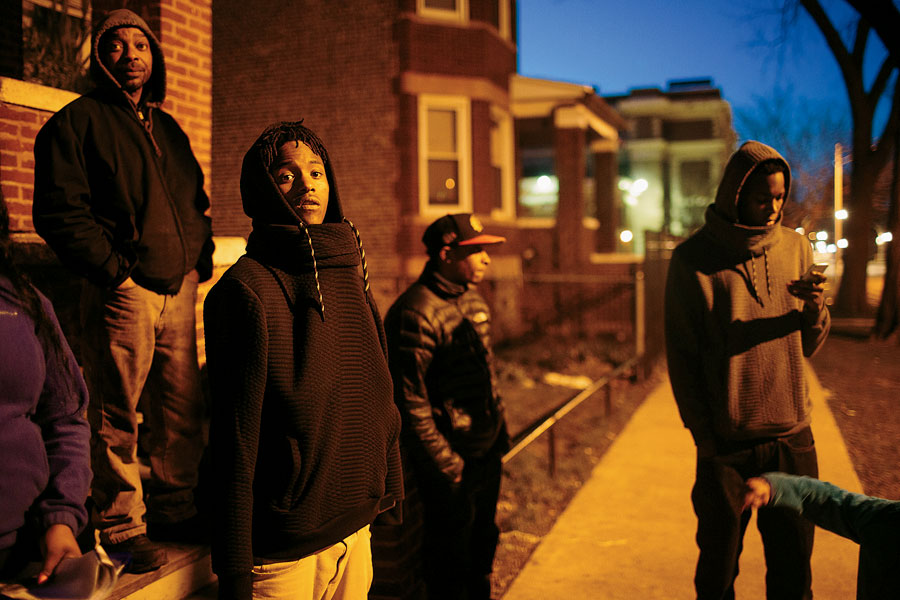
Like a lot of teenage boys, Jerryon is prone to obsess about his lack of cash, his desire for new sneakers, and his interest in girls and cars. And also like a lot of teens, he regularly bucks against his mother and makes dumb decisions. But for Jerryon, the stakes are high: If he keeps hanging on the corner with his crew and goes back to selling dope, he could land in Cook County’s Juvenile Temporary Detention Center or a state facility. If that happens, his chances of graduating from high school drop 39 percent compared with an average kid in his neighborhood, while the likelihood of his becoming a repeat offender jumps 41 percent.
“One giant responsibility that the justice system has is to keep kids out of it, because very seldom does the system improve outcomes,” says Stephanie Kollmann, the policy director at Northwestern University’s Children and Family Justice Center. “It’s really difficult for most teenagers to think ahead. The part of the brain where they’re able to apply, in the heat of a moment, a vision for the future that will prevent them from doing something bad just isn’t developed yet.”
Jerryon is at a particularly critical age for a black kid growing up in a bad neighborhood. In Chicago, more than 30 percent of African Americans ages 16 to 24 are both out of school and out of work. Since September 2011, more than a thousand Chicagoans under 17 have been shot, and homicide remains the leading cause of death for black youths in this country.
And then there is the possibility of getting locked up. Nationally, young African Americans are 4.6 times as likely as their white peers to be incarcerated. “Black youth and white youth use drugs in similar proportions, but their arrest rates for drugs are racially disproportionate,” says Kollmann. “The conviction and imprisonment rates are even more so. White kids in the suburbs sell drugs, too. Nobody’s throwing away anybody’s Ivy League admission because they sold a few drugs. We see those futures as worth protecting.”
Jerryon might not yet know how to weigh his immediate actions against his future well-being, but his grandmother does. “The streets are a drug,” Jackie says. “I keep telling him—because it’s true—that there’s only two things that could happen if he keeps living this life: He’ll either go to jail or he gonna die.”
The two-flat on Drake Avenue where Jerryon lives is a flurry of activity. Ten people live in this five-bedroom house: Jerryon’s 35-year-old mother, Chrishona Hodges, and her three kids; her younger sister, Christen, and her three kids; and their parents, Jackie and Chris, who though no longer a couple still reside together, just on separate floors. Jerryon shares a bed with his brother, Jacques. Other relatives and neighborhood friends are in and out constantly, often bunched up on the living room couch playing Call of Duty or getting their hair braided.
Suddenly 3-year-old Ja-Ziyah, Chrishona’s youngest, rushes in, wearing her aunt’s wig and talking on a broken cell phone. “Hello?” she says to the blank screen. “Hello?” Following behind her are two young girls, her cousins. They spin around the room a few times in a dance of cartwheels and tackles, giggling and screaming. “It’s always crazy in here,” says Chrishona with an exasperated laugh.
It doesn’t take long to see that Jackie calls the shots in this household. The 54-year-old shoot-from-the-hip straight talker—who punctuates most of her sentences with a knowing “mm-hmm”—could be the mayor of the block. She grew up in the neighborhood and raised her two daughters in this house. Everyone calls her Ma or Ms. Jackie, and she will say the same thing to most people she meets: “I been here a long time, and I seen a lot, and I’m not going to sugar it for you, either.”
What you seldom see in this house—other than Jerryon’s grandfather—is adult men. There have been so many in Jackie’s family to wind up in jail or worse that it takes her three tries to tally them. “OK, now let’s see,” she says, leaning back in her chair. “Jerryon’s dad, Duke’s dad, Chrishona’s cousin Floyd … Let me see … I probably need a pencil.” She tries again, this time with paper: “My brother Jeff, my nephew Willie … Um … hold on, let me think about this.” Finally, holding her hands up in the air, she counts 20. Twenty men in the last three generations who have been incarcerated or killed.
Jackie and Chrishona live in constant fear that Jerryon will follow the same path. At this moment, as is often the case, he’s not home, and no one seems to know where he is. Out running the streets, they figure.
Ask anyone who knows Jerryon, and they’ll tell you there are two sides to him. There is the short-fused teen seething with anger who is often unable to control his emotions. Since grade school, his mother estimates, he has been suspended 10 times for fighting. His disciplinary reports fill a manila folder that Chrishona keeps. Twice, at a loss for what to do, she has taken him to Hartgrove psychiatric hospital—once at age 12 after yet another fight and the other time at 14 when she found a bag of weed in his sock drawer.
“I don’t know what happens, but it’s like something just set him off,” Chrishona says, her normally melodic voice now pinched with restraint. “It’s too much violence and death out here to do that stuff. But he so hardheaded, I don’t know what it’s going to take for him to change. I really don’t.”
Then there is the other side of Jerryon. A soft-spoken, vulnerable kid who is fiercely loyal to his family and friends. He listens more than he talks. He texts his grandmother at night to tell her he loves her. He makes his mother laugh. He sometimes uses his allowance to buy his best friend, whom everybody calls Mini Man, clothes for school and food for dinner. “As rough and thuggish as he act, Jerryon don’t want to see anybody without anything,” says Jackie.
But that side of him is starting to slip away. “I’ve watched Jerryon change from the kid that was willing to try most anything, determined to do everything, to someone who won’t let himself try,” says Jackie. “I don’t like the changes I see. He’s too gifted for that.”
Soon Jacques, 18 and the oldest of Chrishona’s three kids, walks into the house. “Ma, will you take me to Foot Locker?” he shouts at his grandmother from the living room. “It’s closing soon.”
Jacques takes honors classes at Orr and played on the football team. In the fall, he’ll head to Northern Illinois, where he plans to study business and engineering. “People never believe Jerryon and Jacques are brothers,” says Chrishona. “They’re just so different.”
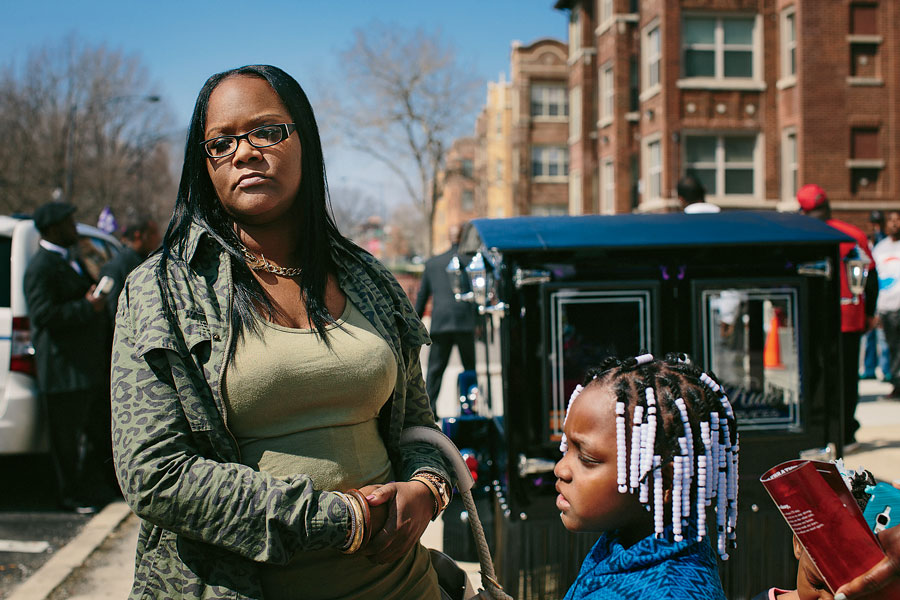
February 5, 7:29 a.m.
Text message from Chrishona:
Good Morning!!! Our cousin was killed on Sunday. The funeral is next Saturday. He was my age 35. I don’t know if you saw on the news, a 16 year old boy was killed on Tuesday that was Jacques friend he went to Orr. He was also on the football team with Jacques.
Jackie is waiting for Jerryon once again. He’s late coming home from a friend’s house on the North Side. Not alarmingly so, but enough that she has called him five times—and gotten no answer. It’s a routine she knows well. “Every single day, when I hit the block, the first thing I do is look for him,” she says.
By the time Jerryon arrives, around 4 p.m., the street is swarming with neighborhood kids. It’s an unusually warm Friday evening in March, so Jerryon decides to take me on a tour of the eight-block area where he spends most of his time. The walk begins on Huron Street, with Jerryon pointing out various buildings where his friends and cousins live. Jacques has tagged along, and the brothers banter about the makes and models of their dream cars and who would win in a drag race and when they’ll next go to Foot Locker.
Four boys congregate in the middle of the street. “Welcome to Chi-Raq!” shouts one, spreading his arms wide. Jerryon laughs. Up ahead, St. Louis Avenue is cloaked in a haze of smoke. Men and boys dot the sidewalk, some leaning up against a fence, others standing beneath the bare branches of a particularly large tree. A few are selling garden-variety drugs to anyone who will buy.
It’s not an unusual scene in the neighborhood, where more than a third of residents live below the poverty line and the per capita income hovers at $13,400, barely half the city average. Among the city’s 77 community areas, Humboldt Park ranks 15th for violent crimes. Over the past year alone, it has been the scene of 27 homicides.
We turn onto Chicago Avenue, the main drag and the site of an ongoing turf war between several West Side gangs, including the Ts (short for Traveling Vice Lords), with whom Jerryon claims to be affiliated, and the Royals (short for Simon City Royals), rumored to be responsible for a handful of shootings in the past few months.
Last summer, Jerryon was arrested not far from here and charged with intent to distribute heroin. It was the first of his three arrests within four months—the second was for riding in a stolen car (a charge that was later thrown out) and the third for possession of heroin. He says he turned to selling drugs to solve his money woes. “Well, I only got one parent, and that’s my mama, and there was more things I wanted to buy,” he says in a soft tone. “I wanted to buy an outfit. So I thought I’d work to get it, and I started selling drugs.” The third arrest landed him in the juvenile detention center for a night, an experience he downplays, describing it as like “any other night. I went to bed and woke up in the morning. I was mad, but I wasn’t nervous or nothing.”
Jerryon was sentenced to two years’ probation on the drug convictions. He must now keep a 10 p.m. curfew, attend anger management classes, have perfect school attendance, and abstain from using and selling drugs. Though the terms of his probation are relatively light, his mom says he has found it challenging to meet them. If Jerryon slips up and gets caught, his probation officer has the option to bring him back to court, where a judge will either give him a second chance or send him straight to juvenile prison, and Jerryon could serve up to seven years.
Does he worry about getting locked up?
“No, I ain’t gonna do nothing else,” he says. “I still want to be outside. There’s stuff I want to do.”
I ask him what he sees as his future.
“A whole lotta money. I want to have more money than my grandpa. I want to get famous. I’m gonna get famous some way.”
Famous for what?
“What do you mean?”
For being a rapper? A writer? A scientist?
“I haven’t made my mind up yet.”
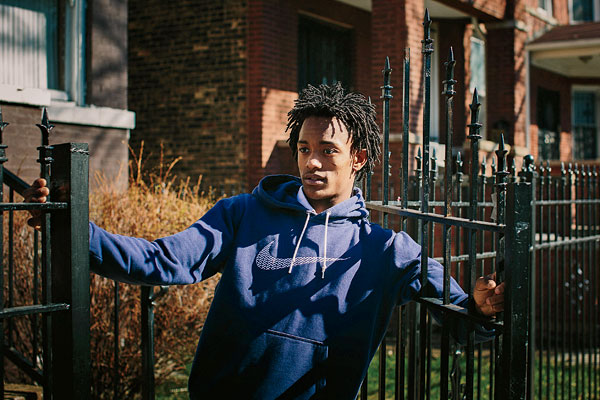
March 18, 11:24 a.m.
Voicemail message from Jackie:
Just giving you a heads-up that nobody knows where Jerryon is.
Chrishona has a drawing she keeps under her bed. Yellowed and folded in two, it’s a family portrait of sorts, one Jerryon created in kindergarten when a teacher asked the combative boy to illustrate what was upsetting him. On the right side, there are four figures: Jerryon, his brother, his aunt, and his grandmother. On the left stand his father and mother, who has something wrapped around her neck. Jerryon’s explanation, transcribed by the teacher, is written alongside: “My daddy is choking my mama with a string and her feet tied. My grandma sad because my daddy is choking my mama.”
Jerryon’s teacher called his mother in to show her the picture, and when Chrishona saw it, she was heartbroken. Jerryon, she says, had witnessed an abusive scene at home a few weeks before.
Chrishona then tells me a story from even earlier in Jerryon’s life. “When he was, like, 4, me and his daddy had a fight, and Jerryon was crying in his room. And when I went to get him, he was like, ‘Why don’t you kill him?’ And I said, ‘I can’t because then I’ll go to jail.’ And he was like, ‘I’ll do it. Babies can’t go to jail.’ When I woke him up the next morning, he was sleeping with his water gun.”
Growing up, Jerryon was accustomed to his father being gone for months, even years, at a time, in jail on convictions related to drugs and fencing stolen property. But those times were actually preferable to when he was home and acting violently toward Chrishona. At least 15 times, she says, she called the cops on him, and in 2005, when Jerryon was 5, his dad was convicted of domestic battery.
Jerryon started acting out violently himself. His fighting at school got so bad that Chrishona had to take leave from her job as a collection agent. “I realized he was doing this because he didn’t want to be away from me,” she says. “He felt that every time he didn’t see me for a while, I came back hurt. That’s why he acted a fool at school, because he knew if he got in trouble, they would call me.” Jerryon was later diagnosed with separation anxiety and ADHD. (He also has a degenerative ear condition that has left him with partial hearing loss. Both of his paternal grandparents are deaf.)
Chrishona finally left Jerryon’s father for good in 2005. Now and then, he will pop up to take Jerryon shopping or drive him around the neighborhood. Then, just as quickly, he’ll disappear again. When Jerryon talks about his father, he grows quiet. And what he does say is more in sputters than sentences. “I don’t talk to him no more. I just stopped talking to him. I called him one day, and he was like …”
Jerryon’s voice cracks. He lowers his head, fanning his fingers across his brow as he tears up. “I don’t want to talk about it.”
Chrishona watches her son as he struggles to get the words out. She’s crying, too. “Jerryon always wanted his daddy around,” she says, handing him a tissue. “And he is always trying to get him to do stuff. But I tell him …” She pauses and looks at Jerryon. “Don’t I tell you that you can be better?”
“Yeah,” he responds in a near whisper.
His brother, Jacques, who is gangly and quiet and has an easy smile, had a much different upbringing. Chrishona was only 17 and still in high school when he was born—he has a different father than Jerryon—so Jackie raised him. Growing up, Jacques was never exposed to the same kind of domestic violence that Jerryon was. Nor does he have the feelings of abandonment that haunt his younger brother. “Jerryon grew up to be a protector,” says Jackie. “Jacques really grew up not caring about his father because he never really knew him.”
The contrast between the two is a common topic that Jerryon has absorbed. “Jacques, he stays in school, and he stays after school to do more work,” Jerryon says. “Jacques, he do what he got to do. Me? I’m good, too, but sometimes I’m bad. I just do whatever.”
Though they bicker constantly, the brothers are close. Jerryon always sticks up for Jacques, no matter the situation, and Jacques is one of the few people who know how to calm Jerryon in his most heated moments. Which is why the older brother fears what will happen to Jerryon when Jacques leaves for college.
“I don’t know what it would take to make him understand it’s time to stop,” says Jacques. “I tell him if I can go to school and do the work and get out of here, he can. I mean, anybody can. You just gotta want to do it.”
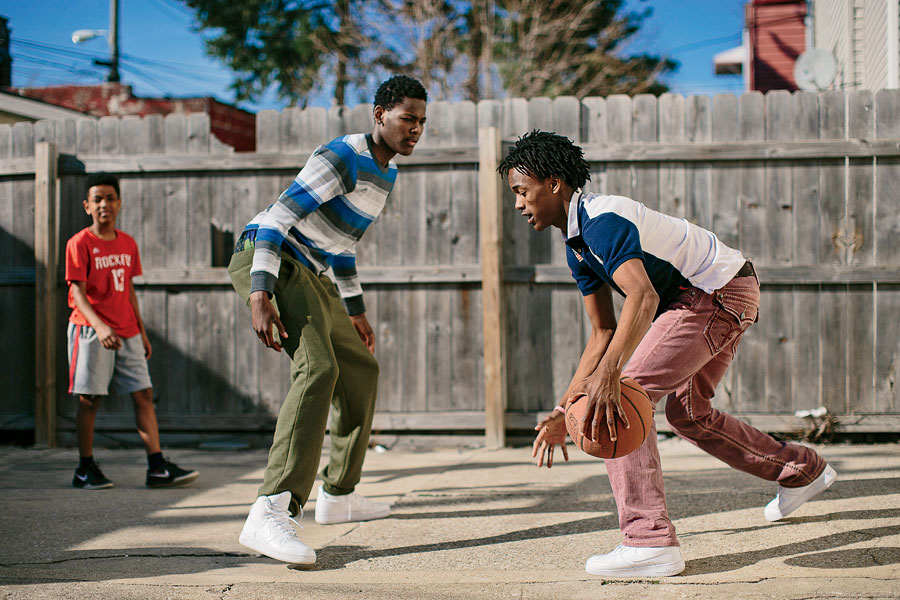
Joshua Brooks is a bear of a man, but a friendly bear. His bulky size, baritone voice, and steady manner exude warmth. Brooks, 34, who grew up in the West Side neighborhood of Austin, runs a program at Orr under the umbrella of CeaseFire, the Chicago-born antiviolence group. At his drop-in center in a second-floor classroom, he works with the highest-risk students to keep them on track to finish school. That’s a particularly daunting task at Orr, where the four-year graduation rate hovers at 40 percent, one of the worst in the city.
Jerryon is among the 15 students Brooks meets with regularly. Between classes, the two talk about everything from girls to violence in the neighborhood. “Jerryon is a man of very few words,” says Brooks. “I mostly just ask questions. I don’t necessarily know if he’s receiving it or not, but I want to make sure that he doesn’t go backwards.”
Brooks frets about Jerryon’s temper. “Until he truly understands the value of peace, I’m always going to worry that he’ll act upon his anger,” says Brooks. “That’s number one for me, that he’ll jeopardize his freedom.”
Which happened to a number of students Brooks has worked with over the past seven years. One, whom Brooks describes as a “phenomenal kid,” was handed a 21-year sentence on a robbery conviction the year before he was to graduate. Another, whom Brooks mentored for nearly three years, struggled to turn his life around. “I visited him in jail,” recalls Brooks. “I’d find him on the street and tell him to go to school.” Then one day, while Brooks was at a birthing class with his wife, he got the dreaded call: It was from a social worker, telling him the boy had been killed in a shooting.
Does he worry that the same thing will happen to Jerryon? Brooks is optimistic: “As long as he’s alive, there is hope. As long as he’s alive, there’s a chance he can change.”
Unfortunately, Brooks won’t be in a position to monitor Jerryon so closely for much longer. This summer, the Centers for Disease Control and Prevention funding for CeaseFire’s program at Orr will dry up. Brooks says he’ll continue to check in with Jerryon when he can, and it’s a noble thought, but the reality is that he simply won’t be around for him on a daily basis.
In a back corner booth at the Old Country Buffet in Belmont Cragin, Jerryon digs into the first of what will be three plates of ribs. Coming here after church is something of a family ritual. Seated next to him is his 17-year-old cousin Tyneicesha Tate, or Te Te. The two are close; whenever Jerryon falls off the grid, Tyneicesha is one of the first people his mother calls.
Jerryon is still reeling from a recent tragedy. Three days earlier, his friend Lucas, known as Baby T, was killed in a drive-by shooting. Jerryon, who spent almost every afternoon hanging out with Lucas, had been with him moments before he died.
When I ask Jerryon what happened, he begins with such clarity that you’d think he was reading from a movie script: The two friends were on the corner of Trumbull and Chicago Avenues when Jerryon’s mother called him to meet her at a strip mall. He’d gotten a couple of blocks when he heard shots and ran the rest of the way. About half an hour later, he saw a Facebook post that read: “Get well soon Baby T.” That’s when he realized those shots had hit Lucas.
Jerryon gathered his friends and headed to Stroger Hospital, but by the time they got there, it was too late. “We were sitting outside [the hospital room] and we couldn’t go in,” Jerryon says. “They just told us he didn’t make it.”
The incident was not the only time Jerryon had lost someone close to him from violence. At one point while we are eating, he takes off his ever-present navy Nike sweatshirt. The T-shirt underneath shows a collage of photos of a young guy smoking, fanning bills, and driving a car—a tribute to his cousin Devontae Harrison. “He was 21,” Jerryon says, looking down at the images. “Died two years ago. Shot.” (When I later ask Chrishona about the T-shirt, she tells me that Jerryon wore it for two months straight after Devontae was killed.)
Tyneicesha chimes in: “He was shot right near Orr. But he drove all the way down Chicago Avenue. I think he was trying to go to the hospital.”
Devontae never made it there. He was pulled over for speeding and fell out of his car onto the street.
Tyneicesha looks at Jerryon. “You was right there.”
“Uh-huh,” he says.
Turns out that Jerryon and his friends happened to be standing at that corner at the time. Devontae died in front of Jerryon.
Doesn’t witnessing something like that make him want to change his life?
“I don’t want to be like this,” Jerryon answers. “This is how I was born.”
He pauses, as though to reconsider his answer.
“Yeah, I can change, but I don’t know when. I don’t know what’s going to happen.”
It’s the day before Easter—a bright, cloudless morning—when kids and adults gather in clusters outside Stone Temple Missionary Baptist Church in North Lawndale for the funeral of Jerryon’s friend Lucas. Chrishona and Jackie stand nervously off to the side. “We gonna look at the body and get up out of here,” says Jackie. “They say there’s going to be a shooting here today.” Lucas was affiliated with the Traveling Vice Lords, and word is that a rival gang might be looking to target the funeral.
Jerryon paces the sidewalk. He circles one concrete square, then another, eyes darting through the crowd. “He’s looking for his friends,” says Jackie. “They’re his security blanket.” Chrishona’s cousin Shenell Duncan watches Jerryon and shakes her head. “He act like a man, but he really just a baby.”
Around 10:30, nearly a hundred mourners form a line outside the church. “I’m sick of coming here,” one woman mutters, wiping tears from beneath her sunglasses.
The line moves slowly. It takes nearly 15 minutes to reach the second-floor chapel, where Lucas’s body is propped at a 60-degree angle and encased in a glass box like a museum display. He’s dressed in jeans and a white hoodie.
Jackie and Chrishona sit in the back and watch Jerryon. He’s making his way to the front, but when he gets about 10 feet from the body, he pauses, then turns around and finds a seat in a far corner.
After a few minutes, Chrishona decides it’s time to leave. She comes out of the church to find her car blocked in by the waiting funeral procession. Even if she could pull out, she wouldn’t get far—the street is barricaded by six patrol cars. The police must have heard the chatter about potential gang action.
Across the street, some 20 young men, there for the service, pepper the grassy patches that bisect Douglas Boulevard. Chrishona eyes them. “The thing about these funerals is, you don’t know who has a gun,” she says. “It’s sad but true.”
Increasingly frustrated, she walks to the end of the block to see if there’s a way out. There isn’t.
“Jerryon don’t know it, but slowly but surely, I’m getting my baby up out of here,” says Chrishona as she walks back to her car. “I’m going to buy us a house somewhere where all the lawns look the same and the blocks are quiet. I’m not going to give up trying.”
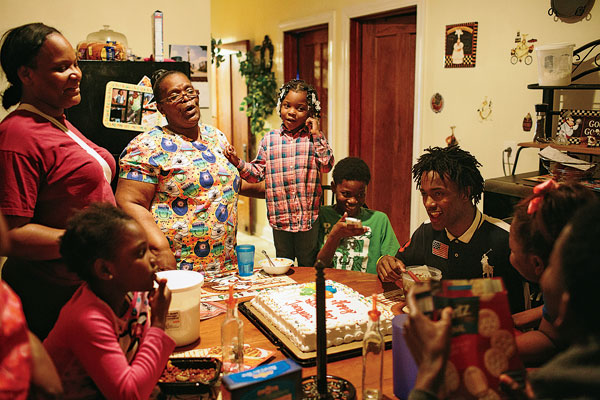
March 31, 8:51 a.m.
Text message from Chrishona:
Just giving you a heads up jerryon never went on Drake [Avenue] and no one know where he is. I don’t know where he is.
Even if Chrishona does save up enough money to buy a house in the suburbs—Oak Park and Maywood are her top choices—there are thousands of other families who will remain stuck in the worst Chicago neighborhoods. And that means thousands of other teens will struggle, like Jerryon, to make good choices in alarmingly treacherous conditions.
Recent research shows that more than 80 percent of youths in inner-city areas have been exposed to trauma, a reality often compared to kids growing up in war zones. “Young people struggle in the best of circumstances,” says Bradley Stolbach, a trauma psychologist at the University of Chicago Medicine Comer Children’s Hospital, “and then you have kids whose lives are at risk as soon as they walk out the door, who have no work, whose friends are getting killed. It’s not surprising that they struggle. Everything in their life becomes about surviving and adapting. And if they [believe they have] a life expectancy that’s 20 to 25, it’s very hard for them to be motivated to change.”
In other words, if Jerryon can’t imagine a future worth saving, how is he supposed to fight for it?
So what’s the solution? Says Stolbach: “If you give people a sense that they deserve a future, that they feel like they have a reason to live, then they’re much more likely to do things that will help them survive.”
One way to do that, he says, is by giving them jobs. That’s been a problem in Chicago. A report this year from the University of Illinois at Chicago’s Great Cities Institute noted that unemployment among young people in Chicago is “chronic, concentrated, and comparatively worse than in Illinois, the U.S. and both New York City and Los Angeles” and that the situation is particularly bad for young black men on the South and West Sides. In the wake of that report, two Cook County commissioners introduced proposals meant to create more jobs for local youths. As of the end of April, neither proposal had come up for a vote.
Another way to help kids beat the odds, says Cook County’s public defender, Amy Campanelli, is to stop locking them up. She is campaigning to reduce felony drug charges to misdemeanors for adolescents—and to decrease the length of their probation. Campanelli also wants to see more rehabilitative alternatives to prison, such as Redeploy Illinois, a state-funded program that offers therapy, mentoring, and jobs to juvenile repeat offenders. “Teenagers are impulsive, and they’re risk takers,” says Campanelli. “And we tend to think of kids who get in trouble as adults. They don’t get the benefit of just being kids.”
April 7, 4:59 p.m.
Text message from Chrishona:
[An accompanying photo, taken not far from Chrishona’s house, shows a policeman pulling yellow tape across a sidewalk at the corner of Chicago and St. Louis Avenues, where two young men lay. One victim was 18, the other 23, both from the South Side. At first glance, though, one of them looked like Jacques, which sent Chrishona into a panic.]
It hurts me so much because I brought them into this world and I’m supposed to protect them and it’s like I’m playing russian roulette with their lives everyday I stay around here. I refuse to let these streets take my babies.
Over the course of six months, I pose the same question to various members of Jerryon’s family: What do they worry about most when it comes to him?
Jackie’s response is typical: “That he thinks he’s untouchable. That one day I’m going to pull up on the block and somebody will tell me that they had to take Jerryon to the hospital.”
Finally, I put the question to Jerryon. What does he fear most?
“I dunno.” He shrugs. “I just be living. I don’t think about it, period.”
No matter how much judicial or social reform occurs, and no matter how much the people in Jerryon’s corner try to help, at some point he himself must want to make a change. Perhaps the more appropriate question to raise is not whether Jerryon Stevens can be saved, but whether he can learn to save himself.
More Scenes from Jerryon Stevens’s Life
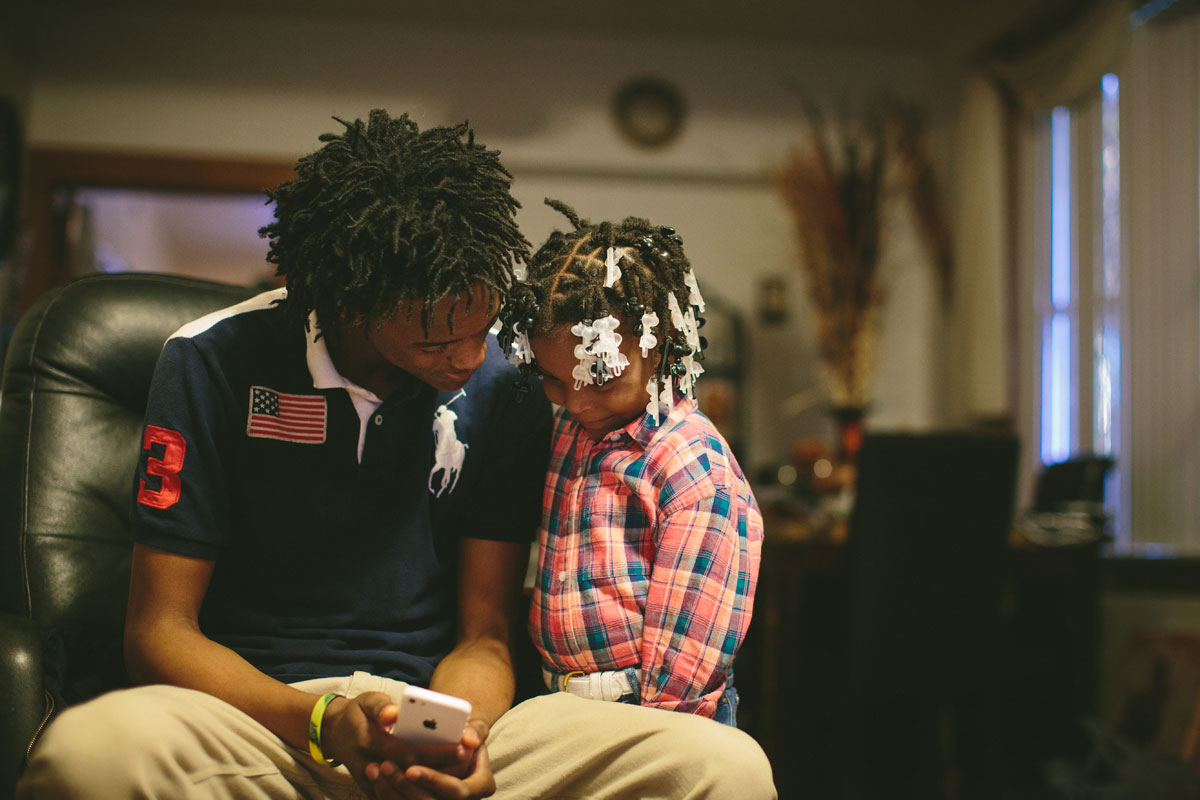

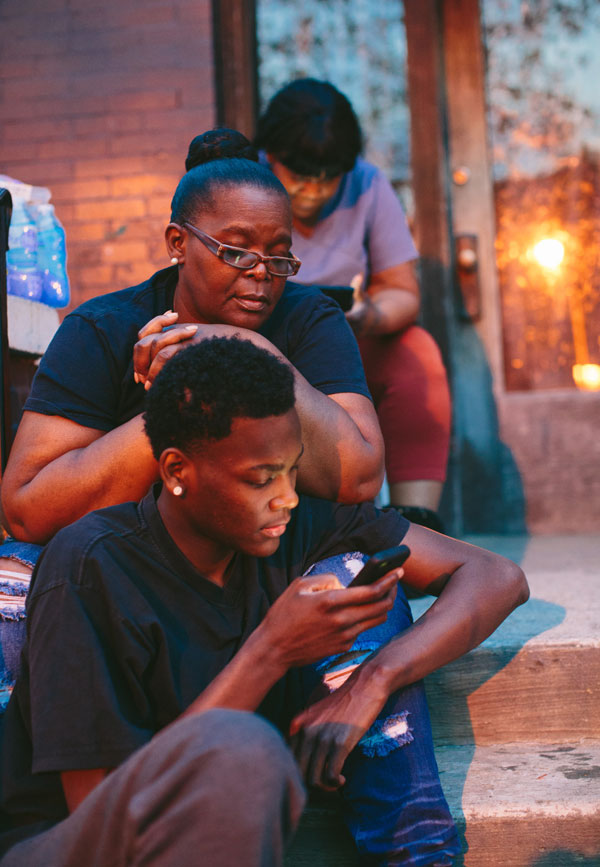
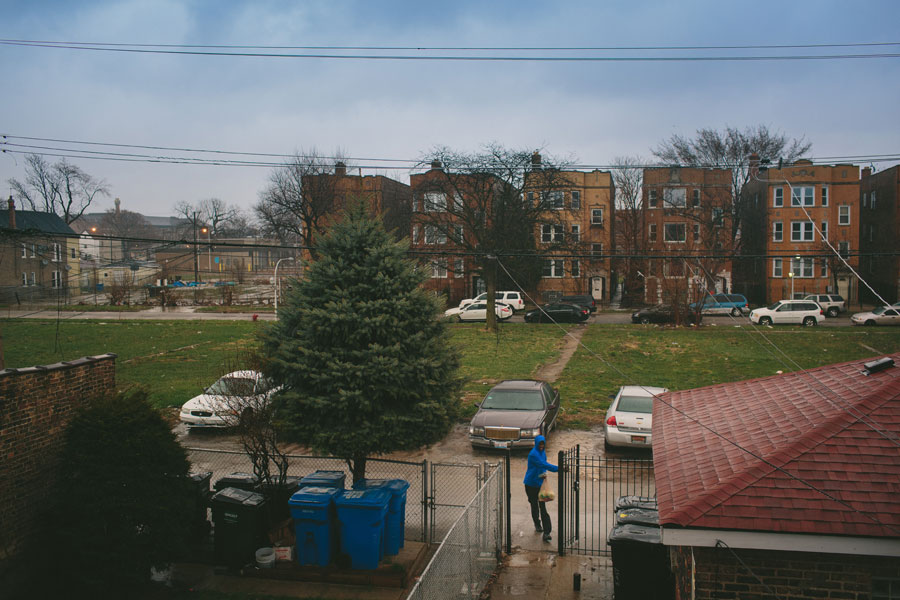
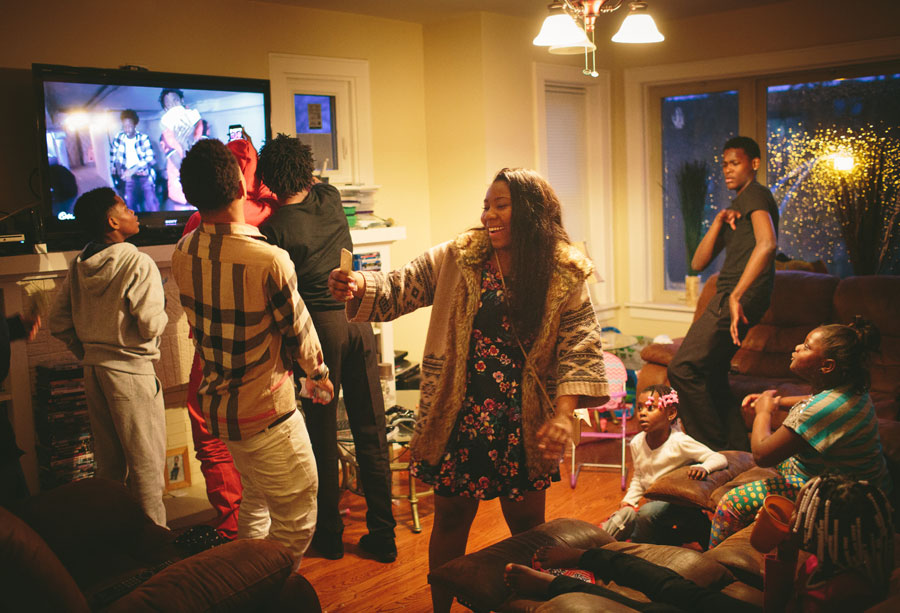



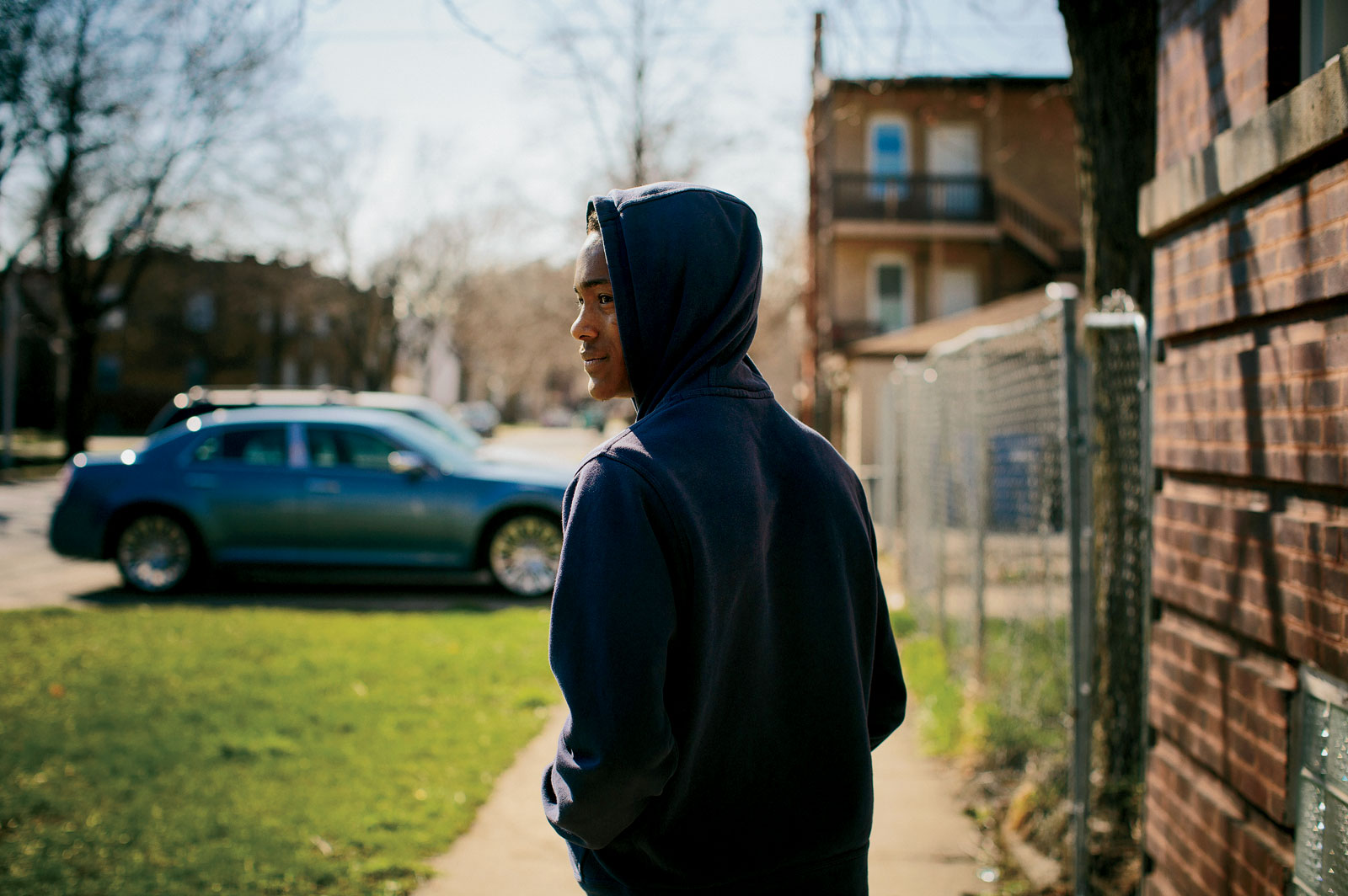
Comments are closed.